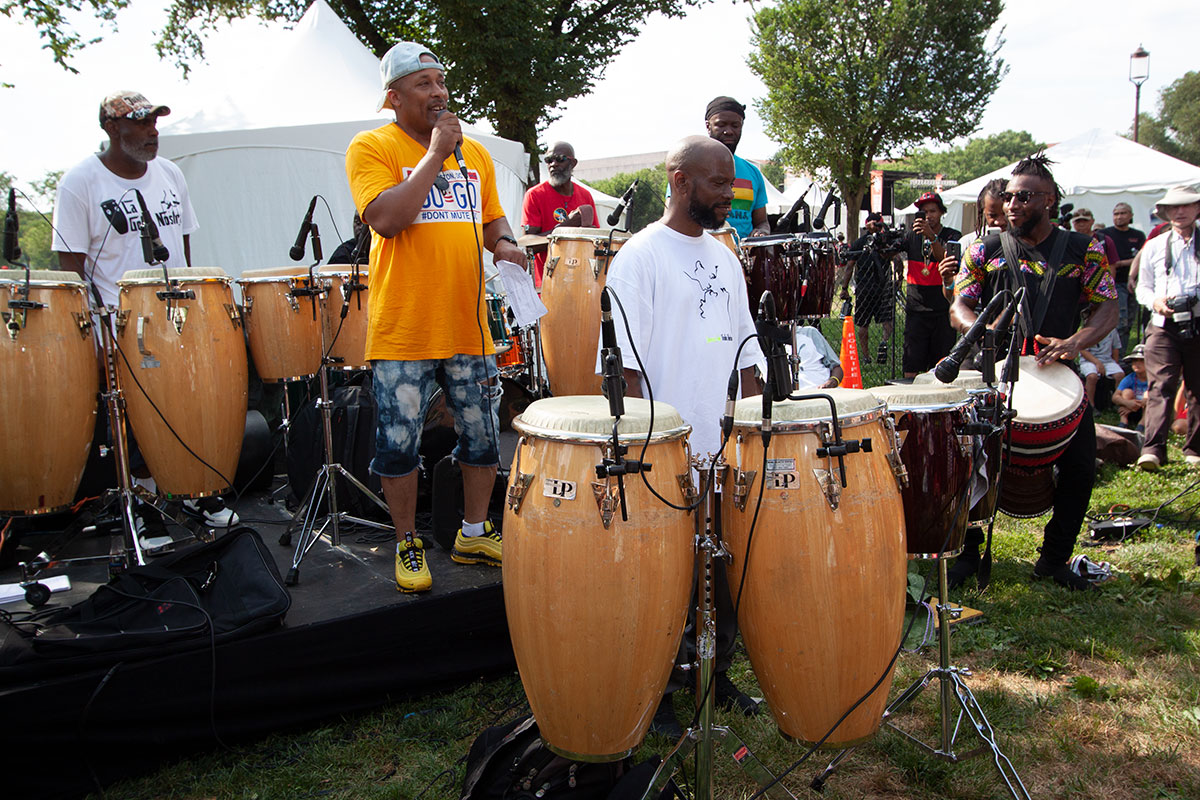The Royal Pocket Tour: Hearing Go-Go’s Ancestral Beat

Ronald Moten (in yellow) and the Royal Pocket Tour at the 2019 Smithsonian Folklife Festival.
Photo by Sonya Pencheva, Ralph Rinzler Folklife Archives
Like a heartbeat, like a deep memory, Ronald Moten has been hearing the drum for a long time.
When he was a kid, his mom would take him to Meridian Hill Park (a.k.a. Malcolm X Park) in Washington, D.C., which rises just a mile and a half straight up Sixteenth Street NW from the White House. The Malcolm X Park drum circle has convened there weekly since the weekend in 1965 when Malcolm X was assassinated. Seeing the different percussion instruments—many transported to the United States through the diaspora—Moten remembers thinking it was cool, but also “that’s some African stuff,” not something that was necessarily his.
For Moten (a.k.a. Moe), it was a gradual revelation, a growing inkling of ancestral connections and resilient histories. In the 1980s, when he was in his late teens, he lived in an apartment across from the park, and he continued to watch the drummers.
“You saw strong men and women confident in who they are,” he says. “It was like unity and love, congregating and vibing together. It was like one spirit. Black love. It felt safe, unique. It felt like it belonged to you.”
Also during this time, for Moten, there was always go-go, D.C.’s homegrown music, driven by the steady groove of the conga players, creating the energy and “pocket” that kept people out on the dance floor.

“But when it really, really hit me is when I came back from prison in 1991.”
After serving time on a drug charge, Moten threw himself into activism and violence-prevention work. As an original member of the organization Cease Fire: Don’t Smoke the Brothers and Sisters, he was introduced to educators and artists who incorporated teachings from African history and pan-African expressions of culture into their work with youth, such as the ritual libations offered at the start of gatherings.
In 1995, he was awed by the scale and cooperative energy of the Million Man March, which kicked off with a morning session of African drumming and dancing. In subsequent years through his youth development work, Moten had the opportunity to meet with leaders like Stokely Carmichael and Winnie Mandela, and through these interactions he was connecting the dots.
“It opened my eyes. I was becoming acquainted with my culture. I saw all the pieces—history, music, spirituality, the use of the drum in protest, education, and healing.”
With the Royal Pocket Tour, Moten narrates this coming to consciousness. Since 2018, he has produced several iterations of this performance—first from the garden stage behind the business he co-founded, Check-It Enterprises (and the future site of the Go-Go Museum & Café), and later while floating down the Potomac River for the thirty-fifth anniversary of the Anacostia Boat Ride, during which he highlighted how their enslaved ancestors had been transported to the region via this same local waterway.
In this 2019 presentation of the Royal Pocket Tour at the Smithsonian Folklife Festival, Moten paid tribute to the artists of D.C.’s go-go music, who he considers his teachers. Featured artists include Agyei Edwards, John “Stinky Dink” Bowman, Keith “Sauce” Robinson, Samuel “Smoke” Dews, Vernell “Wink” Powell, Paul “Buggy” Edwards, Nathaniel “Nate” Field, and Leroy “Scooter” Taylor.
Camera: Pruitt Allen, Rameshwar Bhatt, Ronald Moten, Albert Tong, Harry Zhu
Editing: Charlie Weber
This performance was co-produced with Natalie Hopkinson, with whom Moten had organized a petition earlier in spring 2019 as part of the Don’t Mute DC protests against the residential and cultural displacement of D.C.’s Black communities. At the mic, Ron says, “The djembe was the first drum created in the world.” There are older drums in Africa and other parts of the planet, in fact. But he later clarifies in a conversation that, above all, what he wants to emphasize, and what has meant the world to him, is to envision the drum, in general, writ large, on the African continent—its ancient rhythms and uses, and how it resonates in the hands, bodies, and activism of people moving D.C. today.
In collaboration with the Smithsonian Folklife Festival, as an extension of the 2019 D.C.: The Social Power of Music program, a new version of the Royal Pocket Tour has been produced for the 2020 GO-GO Awards on November 22. See more information and watch the live stream.
Sojin Kim is a program curator at the Smithsonian Folklife Festival and co-curator for the D.C. Music program.

